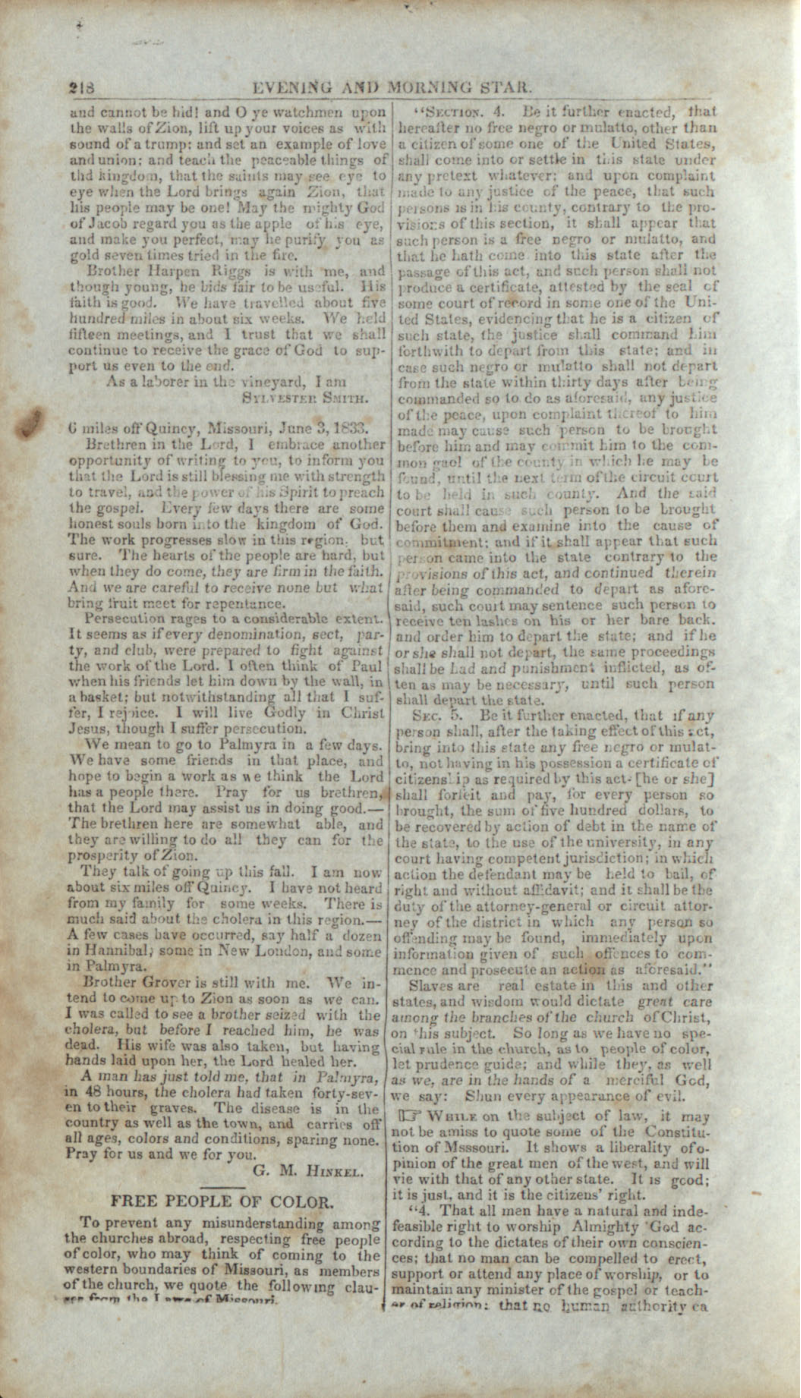Phelps says "we have no special rule in the church, as to people of color."
- Type
- News (traditional)
- Hearsay
- Direct
- Reference
"Free People of Color," Evening and Morning Star 2, no. 14 (July 1833): 218
- Scribe/Publisher
- Evening and Morning Star
- Audience
- Reading Public
- Transcription
To prevent any misunderstanding among the churches abroad, respecting Free people of color, who may think of coming to the western boundaries of Missouri, as members of the church, we quote the following clauses from the Laws of Missouri.
"SECTION 4. Be it further enacted, That hereafter no free negro or mulatto, other than a citizen of some one of the United States, shall come into or settle in this state under any pretext whatever; and upon complaint made to any justice of the peace, that such person is in his county, contrary to the provisions of this section, he shall cause such person to be brought before him. And if upon examination, it shall appear that such person is a free negro or mulatto, and that he hath come into this state after the passage of this act, and such person shall not produce a certificate, attested by the seal of some court of record in some one of the United States, evidencing that he is a citizen of such state, the justice shall command him forthwith to depart from this state; and in case such negro or mulatto shall not depart from the state within thirty days after being commanded so to do as aforesaid, any justice of the peace, upon complaint thereof to him made may cause such person to be brought before him, and may commit him to the common goal of the county in which he may be found, until the next term of the circuit court to be holden in such county. And the said court shall cause such person to be brought before them, and examine into the cause of commitment; and if it shall appear that such person came into the state contrary to the provisions of this act, and continued therein after being commanded to depart as aforesaid, such court may sentence such person to receive ten lashes on his or her bare back, and order him to depart the state; and if he or she shall not so depart, the same proceedings shall be had and punishment inflicted, as often as may be necessary, until such person shall depart the state.
SECTION. 5. Be it further enacted, That if any person shall, after the taking effect of this act, bring into this state any free negro or mulatto, not having in his possession a certificate of citizenship as required by this act, [he or she] shall forfeit and pay, for every person so brought, the sum of five hundred dollars, to be recovered by action of debt in the name of the state, to the use of the university, in any court having competent jurisdiction; in which action the defendant may be held to bail, of right, and without affidavit; and it shall be the duty of the attorney general or circuit attorney of the district in which any person so offending may be found, immediately upon information given of such offence, to commence and prosecute an action as aforesaid."
Slaves are real estate in this and other states, and wisdom would dictate great care among the branches of the church of Christ, on this subject. So long as we have no special rule in the church, as to people of color, let prudence guide; and while they, as well as we, are in the hands of a merciful God, we say: Shun every appearance of evil.
WHILE on the subject of law, it may not be amiss to quote some of the Constitution of Missouri. It shows a liberality of opinion of the great men of the west, and will vie with that of any other state. It is good; it is just, and it is the citizens' right.
"4. That all men have a natural and indefeasible right to worship Almighty God according to the dictates of their own consciences; that no man can be compelled to erect, support or attend any place of worship, or to maintain any minister of the gospel or teacher or religion; that no human authority can control or interfere with the rights of conscience; that no person can ever be hurt, molested or restrained in his religious professions or sentiments, if he do not disturb others in their religious worship:
"5. That no person, on account of his religious opinions, can be rendered ineligible to any office of trust or profit under this state; that no preference can ever be given by law to any sect or mode of worship; and that no religious corporation can ever be established in this state."
- Citations in Mormonr Qnas
The B. H. Roberts Foundation is not owned by, operated by, or affiliated with the Church of Jesus Christ of Latter-day Saints.

